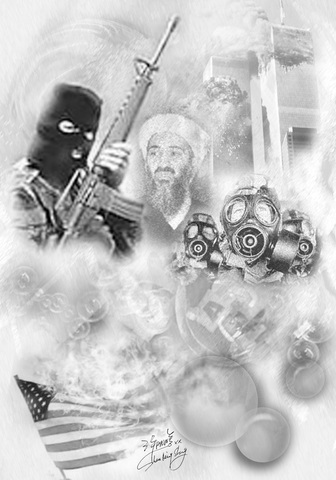Department of Homeland Security (DHS) Secretary Michael Chertoff is not getting a lot of sleep this week.
In addition to his regular duties, he is also a participant in a large-scale terrorism response exercise and has to react to simulated chemical and biological attacks.
The exercise, called Top Officials 3 (TOPOFF 3), involves 12,000 participants from three countries and is the largest such exercise ever conducted in the US. It simulates a biological attack in New Jersey and a chemical attack in Connecticut.

In addition to nearly 300 US agencies, officials from Canada and UK keep participants informed of the latest developments through a secure link.
Real newspapers and broadcasters were not given details about the simulated emergency to avoid tipping off participants.
The exercise is intended to test reactions in an environment that is as realistic as possible. To simulate a car bomb site in Connecticut, piles of rubble and cars were carefully arranged and scores of volunteers played victims.
Makeup specialists made wounds appear realistic and "victims" were given instructions on how to behave. For example, victims of the biological and chemical agents are carrying prompter cards that describe their symptoms so they know how to answer the questions of medical personnel.
"Players don't know what will happen," said DHS spokesman Marc Short.
The simulation is so realistic that some "patient" volunteers are playing the role of people who think they have the disease, and show up at medical facilities demanding treatment for symptoms they have heard on the fake news reports on VNN.
Volunteers who wanted to participate in TOPOFF 3 had to undergo a background check, Short said, to ensure that terrorist groups would not gain insight into the US response system.
Although the exercise is operating on a broad regional scale, it will not adversely impact actual emergency services or the agencies involved, said Short. That is why Chertoff, one of the high-ranking participants, will pull double duty during the exercise.
The types of attack chosen are not based on specific intelligence. Instead, Short said, the chemical and biological attacks represent events that could take place based on the capabilities officials believe terrorists have.
In all, planning and evaluation of TOPOFF 3 took two years and cost US$16 million dollars. Officials say the expenditure is worth it.
"There is no question that our coordination, precision and practice today will save countless lives tomorrow if our nations are ever again attacked by terrorists," Chertoff said.
He said that the simulation excercise offers emergency responders and top officials "a rare opportunity" to practice and validate their capabilities in response to a coordinated terrorist attack.
"It offers the chance to understand the challenges posed by biological and chemical weapons and to witness the cooperation among organizations at every level of government in protecting our homeland against the threat of terrorism," he said.

The Chinese Communist Party (CCP) challenges and ignores the international rules-based order by violating Taiwanese airspace using a high-flying drone: This incident is a multi-layered challenge, including a lawfare challenge against the First Island Chain, the US, and the world. The People’s Liberation Army (PLA) defines lawfare as “controlling the enemy through the law or using the law to constrain the enemy.” Chen Yu-cheng (陳育正), an associate professor at the Graduate Institute of China Military Affairs Studies, at Taiwan’s Fu Hsing Kang College (National Defense University), argues the PLA uses lawfare to create a precedent and a new de facto legal
Chile has elected a new government that has the opportunity to take a fresh look at some key aspects of foreign economic policy, mainly a greater focus on Asia, including Taiwan. Still, in the great scheme of things, Chile is a small nation in Latin America, compared with giants such as Brazil and Mexico, or other major markets such as Colombia and Argentina. So why should Taiwan pay much attention to the new administration? Because the victory of Chilean president-elect Jose Antonio Kast, a right-of-center politician, can be seen as confirming that the continent is undergoing one of its periodic political shifts,
In the first year of his second term, US President Donald Trump continued to shake the foundations of the liberal international order to realize his “America first” policy. However, amid an atmosphere of uncertainty and unpredictability, the Trump administration brought some clarity to its policy toward Taiwan. As expected, bilateral trade emerged as a major priority for the new Trump administration. To secure a favorable trade deal with Taiwan, it adopted a two-pronged strategy: First, Trump accused Taiwan of “stealing” chip business from the US, indicating that if Taipei did not address Washington’s concerns in this strategic sector, it could revisit its Taiwan
Taiwan’s long-term care system has fallen into a structural paradox. Staffing shortages have led to a situation in which almost 20 percent of the about 110,000 beds in the care system are vacant, but new patient admissions remain closed. Although the government’s “Long-term Care 3.0” program has increased subsidies and sought to integrate medical and elderly care systems, strict staff-to-patient ratios, a narrow labor pipeline and rising inflation-driven costs have left many small to medium-sized care centers struggling. With nearly 20,000 beds forced to remain empty as a consequence, the issue is not isolated management failures, but a far more